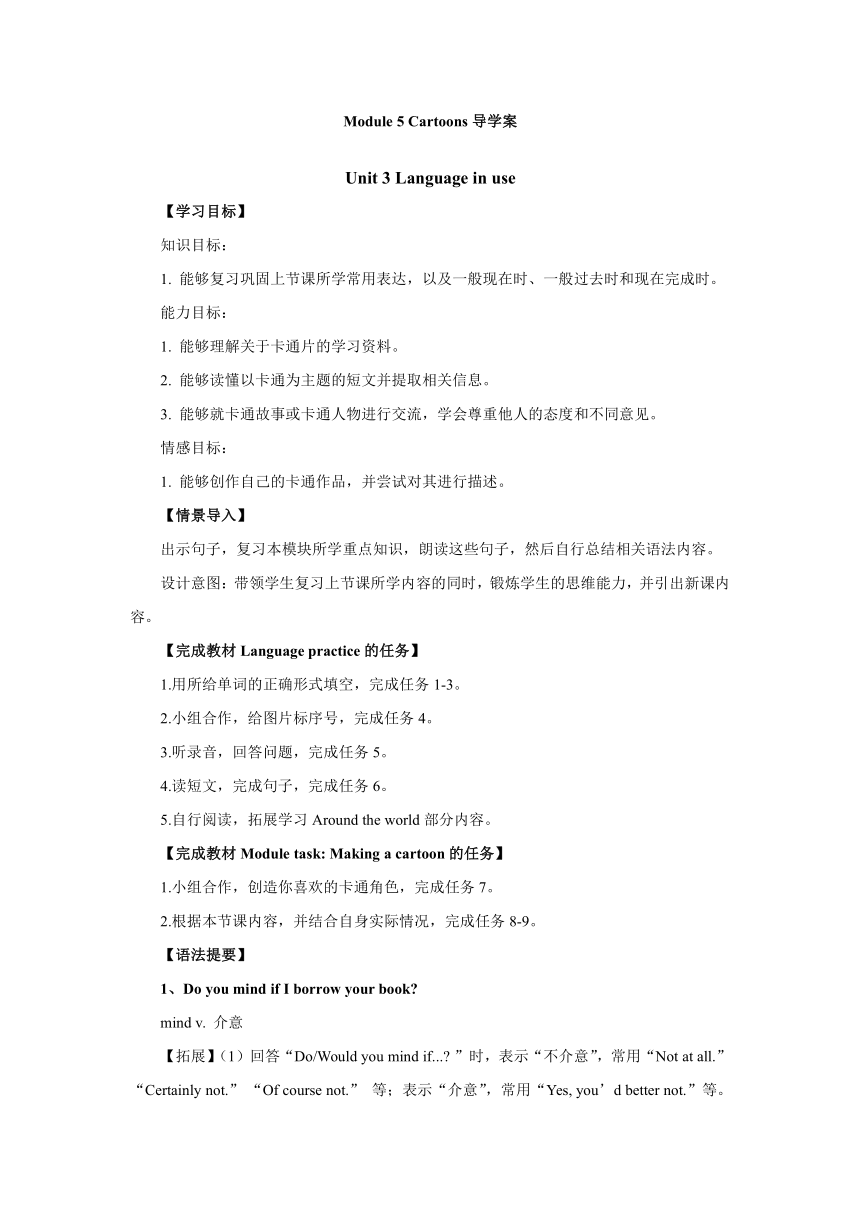外研版八年级下册Module 5 Cartoons Unit3 导学案(无答案)
文档属性
| 名称 | 外研版八年级下册Module 5 Cartoons Unit3 导学案(无答案) |  | |
| 格式 | docx | ||
| 文件大小 | 53.8KB | ||
| 资源类型 | 教案 | ||
| 版本资源 | 外研版 | ||
| 科目 | 英语 | ||
| 更新时间 | 2024-05-31 16:06:18 | ||
图片预览

文档简介
Module 5 Cartoons导学案
Unit 3 Language in use
【学习目标】
知识目标:
1. 能够复习巩固上节课所学常用表达,以及一般现在时、一般过去时和现在完成时。
能力目标:
1. 能够理解关于卡通片的学习资料。
2. 能够读懂以卡通为主题的短文并提取相关信息。
3. 能够就卡通故事或卡通人物进行交流,学会尊重他人的态度和不同意见。
情感目标:
1. 能够创作自己的卡通作品,并尝试对其进行描述。
【情景导入】
出示句子,复习本模块所学重点知识,朗读这些句子,然后自行总结相关语法内容。
设计意图:带领学生复习上节课所学内容的同时,锻炼学生的思维能力,并引出新课内容。
【完成教材Language practice的任务】
1.用所给单词的正确形式填空,完成任务1-3。
2.小组合作,给图片标序号,完成任务4。
3.听录音,回答问题,完成任务5。
4.读短文,完成句子,完成任务6。
5.自行阅读,拓展学习Around the world部分内容。
【完成教材Module task: Making a cartoon的任务】
1.小组合作,创造你喜欢的卡通角色,完成任务7。
2.根据本节课内容,并结合自身实际情况,完成任务8-9。
【语法提要】
1、Do you mind if I borrow your book
mind v. 介意
【拓展】(1)回答“Do/Would you mind if... ”时,表示“不介意”,常用“Not at all.” “Certainly not.” “Of course not.” 等;表示“介意”,常用“Yes, you’d better not.”等。
(2)“Never mind.”意为“没关系。”,常用于口语中。
e.g. —I’m sorry I’m late. 对不起,我迟到了。
—Never mind. 没关系。
mind 后常跟名词、动词的-ing 形式或从句, 常用于疑问句、否定句中。
其常见用法有:
Do/Would you mind (one’s) doing...
你介意(某人)做……吗?
Do/Would you mind if...
如果……你介意吗?
【活学活用】
—Mr. Chen, my kid is sleeping. Would you mind _____ your radio
—Sorry. I’ll do it at once.
A. turning down B. turn down C. turning up D. turn up
2、Why does Betty not think the cartoon is funny at first
at first 当初,起初
【辨析】at first 与first of all
【活学活用】
起初我不喜欢这个城市。
I didn’t like the city ________ ________.
3、He appeared in 1928, first in a black-and-white film without sound...
without prep. 没有,无,其反义词为with。
【活学活用】
—Ms. Huang, what would you like ______ your afternoon tea
—Just a cup of coffee any sugar or milk.
A. for; without B. to; without
C. for; with D. to; with
4、Today, over a hundred years later, cartoons are still popular with people of all ages.
be popular with 受……欢迎
be popular with 后接名词或代词作宾语。
be popular in 表示在某一领域流行或受欢迎。
【活学活用】
Cartoon characters like Monkey King are still p_________ in China.
Unit 3 Language in use
【学习目标】
知识目标:
1. 能够复习巩固上节课所学常用表达,以及一般现在时、一般过去时和现在完成时。
能力目标:
1. 能够理解关于卡通片的学习资料。
2. 能够读懂以卡通为主题的短文并提取相关信息。
3. 能够就卡通故事或卡通人物进行交流,学会尊重他人的态度和不同意见。
情感目标:
1. 能够创作自己的卡通作品,并尝试对其进行描述。
【情景导入】
出示句子,复习本模块所学重点知识,朗读这些句子,然后自行总结相关语法内容。
设计意图:带领学生复习上节课所学内容的同时,锻炼学生的思维能力,并引出新课内容。
【完成教材Language practice的任务】
1.用所给单词的正确形式填空,完成任务1-3。
2.小组合作,给图片标序号,完成任务4。
3.听录音,回答问题,完成任务5。
4.读短文,完成句子,完成任务6。
5.自行阅读,拓展学习Around the world部分内容。
【完成教材Module task: Making a cartoon的任务】
1.小组合作,创造你喜欢的卡通角色,完成任务7。
2.根据本节课内容,并结合自身实际情况,完成任务8-9。
【语法提要】
1、Do you mind if I borrow your book
mind v. 介意
【拓展】(1)回答“Do/Would you mind if... ”时,表示“不介意”,常用“Not at all.” “Certainly not.” “Of course not.” 等;表示“介意”,常用“Yes, you’d better not.”等。
(2)“Never mind.”意为“没关系。”,常用于口语中。
e.g. —I’m sorry I’m late. 对不起,我迟到了。
—Never mind. 没关系。
mind 后常跟名词、动词的-ing 形式或从句, 常用于疑问句、否定句中。
其常见用法有:
Do/Would you mind (one’s) doing...
你介意(某人)做……吗?
Do/Would you mind if...
如果……你介意吗?
【活学活用】
—Mr. Chen, my kid is sleeping. Would you mind _____ your radio
—Sorry. I’ll do it at once.
A. turning down B. turn down C. turning up D. turn up
2、Why does Betty not think the cartoon is funny at first
at first 当初,起初
【辨析】at first 与first of all
【活学活用】
起初我不喜欢这个城市。
I didn’t like the city ________ ________.
3、He appeared in 1928, first in a black-and-white film without sound...
without prep. 没有,无,其反义词为with。
【活学活用】
—Ms. Huang, what would you like ______ your afternoon tea
—Just a cup of coffee any sugar or milk.
A. for; without B. to; without
C. for; with D. to; with
4、Today, over a hundred years later, cartoons are still popular with people of all ages.
be popular with 受……欢迎
be popular with 后接名词或代词作宾语。
be popular in 表示在某一领域流行或受欢迎。
【活学活用】
Cartoon characters like Monkey King are still p_________ in China.
同课章节目录
- Module 1 Feelings and impressions
- Unit 1 It smells delicious.
- Unit 2 I feel nervous when I speak Chinese .
- Unit 3 Language in use
- Module 2 Experiences
- Unit 1 I've also entered lots of speaking competi
- Unit 2 They have seen the Pyramids.
- Unit 3 Language in use
- Module 3 Journey to space
- Unit 1 Has it arrived yet?
- Unit 2 We have not found life on any other planet
- Unit 3 Language in use
- Module 4 Seeing the docto
- Unit 1 I haven't done much exercise since I got m
- Unit 2 We have played football for a year now
- Unit 3 Language in use
- Module 5 Cartoons
- Unit 1 It's time to watch a cartoon.
- Unit 2 Tintin has been popular for over eighty yea
- Unit 3 Language in use
- Revision module A
- Module 6 Hobbies
- Unit 1 Do you collect anything ?
- Unit 2 Hobbies can make you grow as a person.
- Unit 3 Language in use
- Module 7 Summer in Los Angeles
- Unit 1 Please write to me and send me some photos
- Unit 2 Fill out a form and come to learn English
- Unit 3 Language in use
- Module 8 Time off
- Unit 1 I can hardly believe we are in the city ce
- Unit 2 We thought somebody was moving about
- Unit 3 Language in use
- Module 9 Friendship
- Unit 1 Could I ask if you've mentioned this to he
- Unit 2 I believe that the world is what you think
- Unit 3 Language in use
- Module 10 On the radio
- Unit 1 I hope that you can join us one day
- Unit 2 It seemed that they were speaking to me in
- Unit 3 Language in use
- Revision module B
